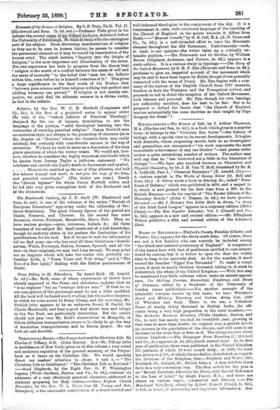Trixotoarear., Booirs.The Prayer - book and the Christian Life. By Charles C.
Tiffany, D.D. (John Murray. 5s.)—Dr. Tiffany (who is Archdeacon of New York) gives us in this volume a very sound and moderate exposition of the general meaning of the Prayer- book as it bears on the Christian life. We would specially direct our readers' attention to chaps. 4 and 5, — " The Christian Life as Intelligent," "The Christian Life as Rational." —Good Shepherds, by the Right Rev. G. F. Winnington Ingram (Wells Gardner, Darton, and Co., ls. 6d.), contains six addresses of a very effectively practical character, addressed to students preparing for Holy eIrtiers.—Some English Church Principles, by the. llev. W. L. Pa;-re Cox (H. Young and Son, Liverpool), is the seasonable contribution of a broad-minded and well-informed theologian to the controversy of the day. It is a restatement in calm, well-considered language of the teaching of the Church of England on the points wherein it differs from Rome.—" Messiah Cometh," by G. E. Jelf, M.A. (A. D. Innes and Co., 7s. 6d.), is a well-intended effort to trace the Messianic element throughout the Old Testament. Unfortunately—such, at least, is our opinion—the writer takes up a critically un- tenable position. —The Tabernacle and its Services, by William Brown (Oliphant, Anderson, and Ferrier, 3s. 6d.), appears in a sixth edition. It is a curious study in typology.—The Story of the Oxford Movement, by G. H. F. Nye (Bemroee and Sons, 35. 6d.), professes to give an impartial account of the movement which may be said to have been begun by Keble, though it was generally connected with the name of Pusey. Mr. Nye begins with a sum- mary of the history of the English Church from 1727 onwards, touches on both the Wesleyan and the Evangelical revival, and proceeds to tell in detail the inception of the Oxford Movement, both literary and personal. Mr. Nye, though his own leanings are sufficiently manifest, does hie best to be fair. But is he prepared to defend the thesis that "the Church of England teaches substantially the same doctrine as that taught by Pope Gregory the Great " ?






































 Previous page
Previous page